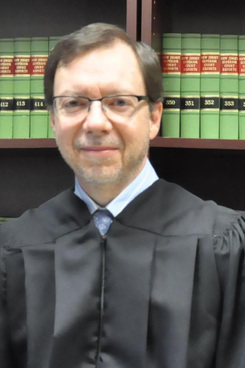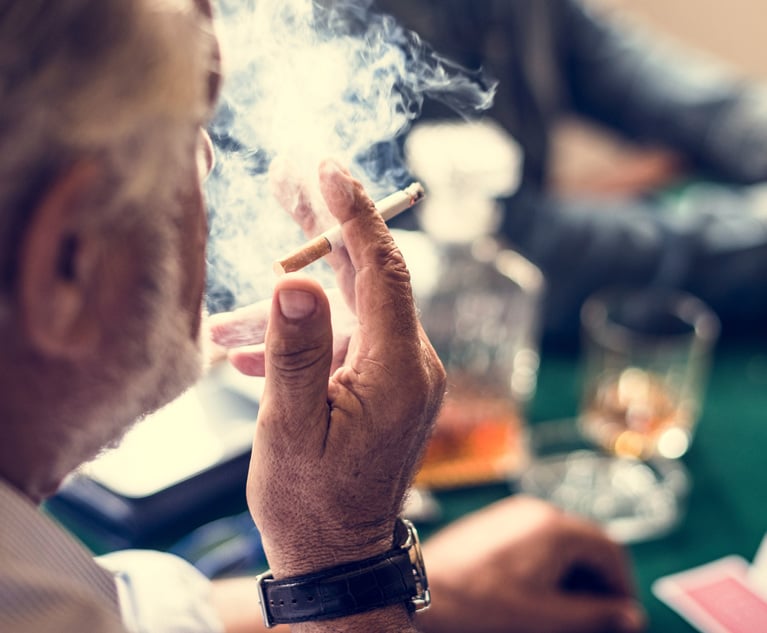A New Jersey judge has rejected a suit seeking to outlaw smoking in the state’s casinos, setting the stage for a Supreme Court showdown on the issue.
A union of casino workers and a grassroots antismoking group claimed in a suit that excluding casinos from a statewide indoor smoking ban violates the constitution by granting a special privilege to a corporation, association or individual. But the judge said the suit did not establish a basis for relief under the constitutional provision against special laws.
The judge also ruled that the suit did not establish a basis for relief under the constitution’s right to safety or under its guarantee of equal protection under the law.
The suit was filed by Region 9 of the United Auto Workers, which represents 3,000 workers in the Bally’s, Caesars and Tropicana casinos, along with Casino Employees’ Against Smoking’s Harmful Effects, or CEASE. That group, formed in 2021 with members in all of Atlantic City’s casinos, includes some who do not smoke but have cancer and other diseases related to smoking, according to the suit.
 Mercer County Superior Court Judge Patrick J. Bartels. Courtesy photo
Mercer County Superior Court Judge Patrick J. Bartels. Courtesy photo
The groups claimed in the suit that Gov. Phil Murphy’s 2021 executive order allowing smoking in casinos violates casino employees’ constitutional right to safety.
But other casino unions joined the case as intervenors and then opposed a smoking ban, as did the Casino Association of New Jersey. They claimed the casinos would lose business if smoking were not allowed.
At a hearing in the case on May, Christopher Porrino of Lowenstein Sandler, representing CANJ, said the suit was “procedurally flawed.” Porrino said there is no constitutional right to safety, although citizens have a right of “pursuing and obtaining safety and happiness.”
“But there is a difference between an individual having the freedom to pursue and obtain safety and happiness and the state having an obligation to guarantee the safety and happiness of its citizens. Of course, there is no constitutional guarantee to safety, just as there is no constitutional guarantee to happiness,” Porrino said at the hearing.
 Christopher Porrino of Lowenstein Sandler. Photo: Carmen Natale/ALM
Christopher Porrino of Lowenstein Sandler. Photo: Carmen Natale/ALM
Porrino added that some will disagree with the Legislature’s decision to allow smoking in casinos, but lawmakers, given the opportunity to change its position on that issue, took no action.
“If the Legislature changes its collective mind and decides to strike a different balance, then the law will change. If not, the law must stand and plaintiffs’ complaint must be dismissed,” Porrino said.
Presiding Chancery Judge Patrick J. Bartels of Mercer County Superior Court granted motions to dismiss by Murphy, acting Department of Health Commissioner Kaitlan Baston, CANJ and the intervenor-defendants without prejudice.
Bartels also rejected the plaintiffs’ request for a temporary and permanent injunction against excluding casinos from a statewide ban on indoor smoking. Bartels said the plaintiffs must show that their request relies on well-settled law and that they are likely to succeed on the merits to win a permanent injunction. But he found that the plaintiffs’ reliance on a constitutional right to safety is not well-settled law.
The plaintiffs’ attorney, Nancy Erika Smith of Smith Mullin in Montclair, said in an email that she intends to appeal the decision, which she said left her clients “devastated.” The decision “acknowledges that they can be irreparably harmed by continued exposure to poisonous second hand smoke. Those with smoking-related illnesses, and my pregnant clients who are more likely to have miscarriages and premature births (with the attendant problems) are particularly upset,” Smith said.
 Nancy Erika Smith of Smith Mullin. Courtesy photo
Nancy Erika Smith of Smith Mullin. Courtesy photo
Smith, citing the New Jersey Constitution’s holding that “All persons are by nature free and independent, and have certain natural and unalienable rights, among which are … pursuing and obtaining safety,” asked, “How then can it be that there is no legal authority of any kind to support [the] argument that safety is a stand-alone constitutional right?”
“The legal authority is the constitution itself! And the court ruling adopting the casino argument that workers are free to ‘pursue’ safety elsewhere ignores the word ‘obtain’ and reality! Coal miners are free to pursue safety by not working in coal mines. Women can pursue not being sexually harassed by not leaving the house! We have evolved as a society so that we ask the government to protect workers from immoral single-focused profit motives of corporations,” Smith said.
Smith added that New Jersey’s Constitution also clearly prohibits “special laws,” especially ones that favor corporate interests.
“I never expected the court to adopt the view that casinos, whose executives make between $11–$18 million a year working in smoke-free offices, are entitled to make their workers not only sick, but sometimes fatally so, in order to make more money. If jobs was the real issue—the state should never have allowed online gambling. That has reduced the visits to brick-and-mortar casinos while putting huge profits in their coffers with almost no overhead,” Smith said.
The Attorney General’s Office, representing Murphy and Baston, declined to comment on the ruling.
CANJ President Mark Giannantonio said in a statement, “We are gratified by the court’s decision to dismiss plaintiff’s complaint and deny its attempt to change the Smoke-Free Air Act outside of the legislative process. The casino industry and other stakeholders, including … Atlantic City and Unite Here/Local 54 have taken significant steps over the years to create a healthier environment for employees and patrons, including limiting smoking to just a fraction of the floorspace. We look forward to continuing to work with stakeholders towards a solution that addresses the health concerns of our employees, while also protecting the collective interest and well-being of the entire Atlantic City workforce.”
NOT FOR REPRINT
© 2024 ALM Global, LLC, All Rights Reserved. Request academic re-use from www.copyright.com. All other uses, submit a request to [email protected]. For more information visit Asset & Logo Licensing.

 Credit: Rawpixel.com/Adobe Stock
Credit: Rawpixel.com/Adobe Stock








